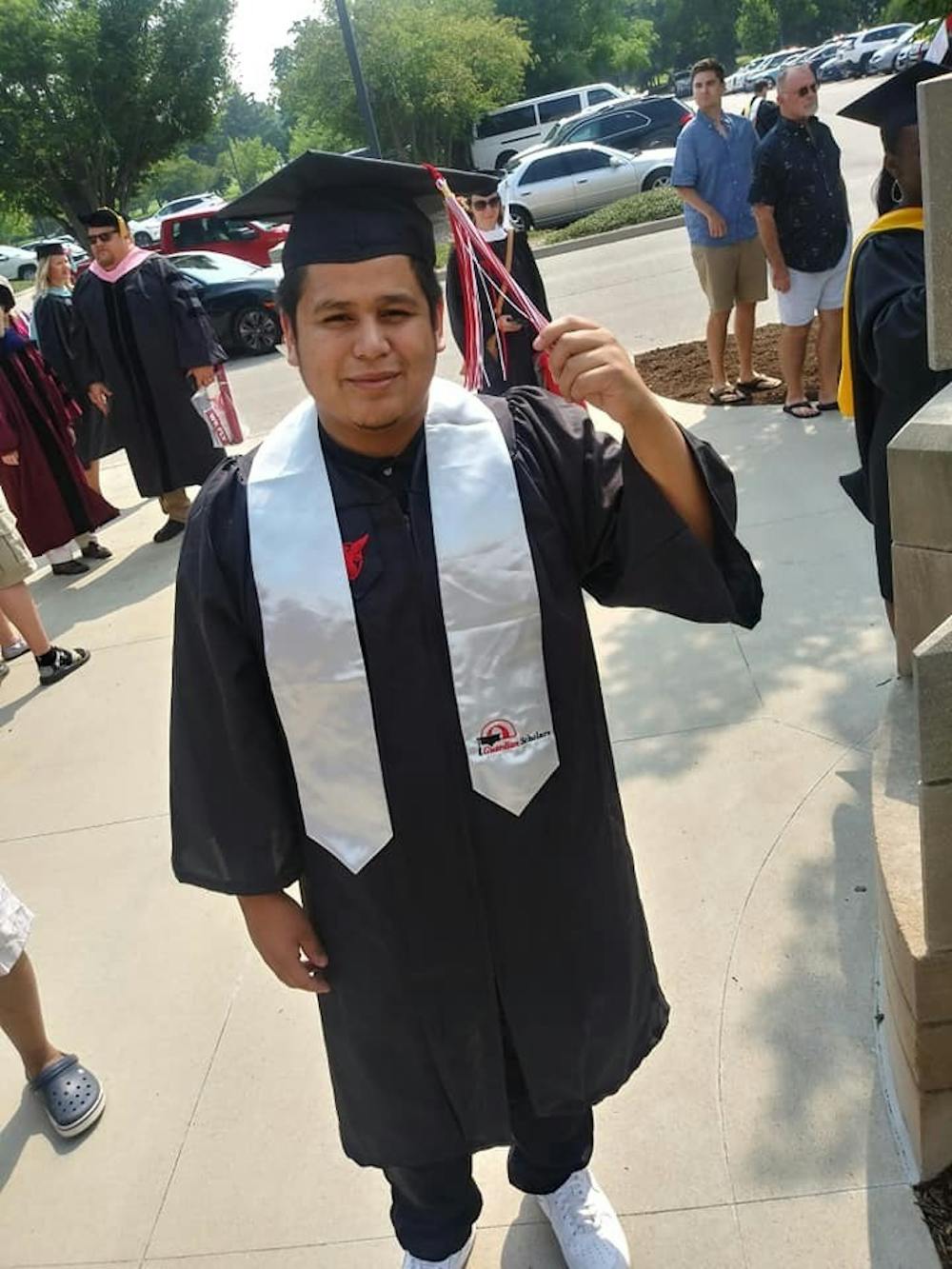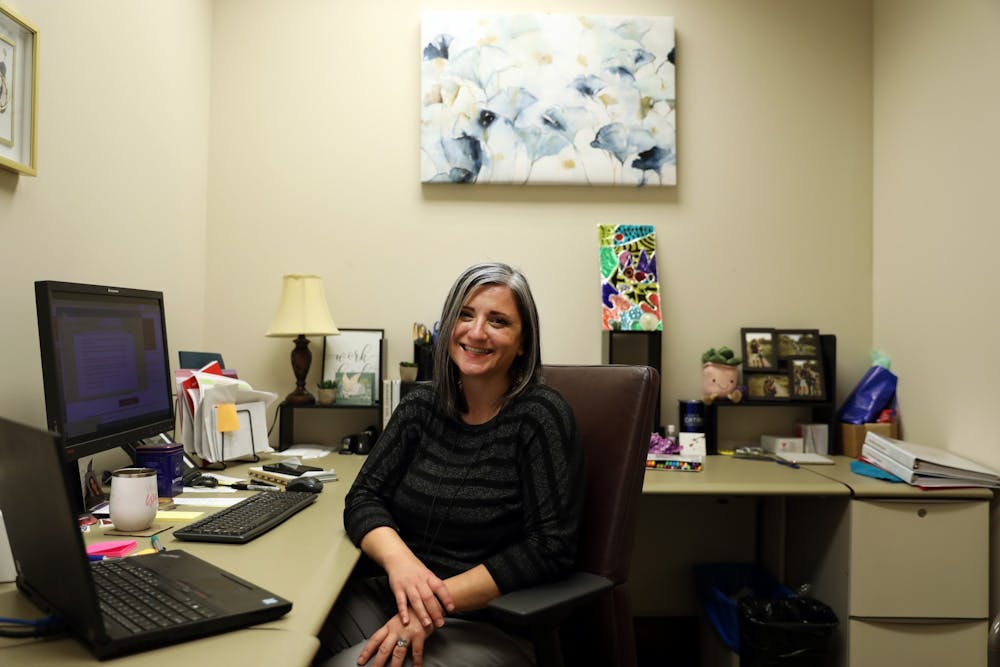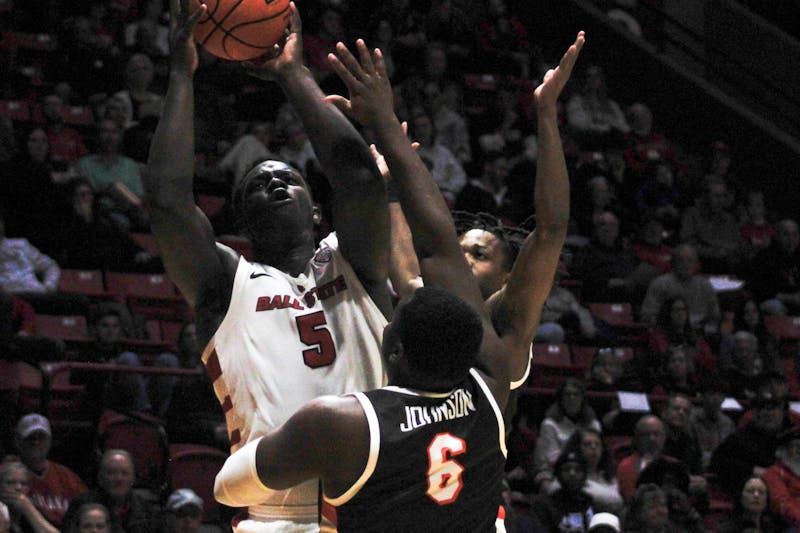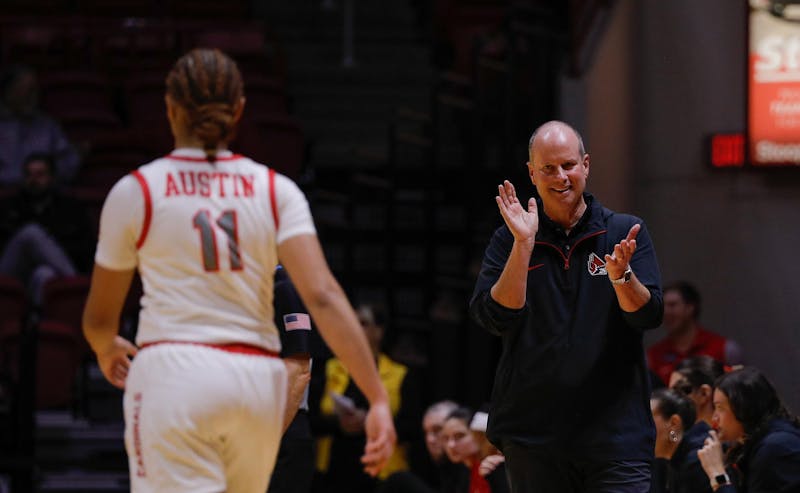Jordan Otero used to think studying for his bachelor’s degree was pointless. When he was a freshman and sophomore at Ball State, he said he struggled in his classes because he thought they would be easier than they actually were.
“I guess I never really wanted a college degree,” he said, “but the fact that I knew I would need it to be in any type of field to help people was what I wanted.”
When Otero graduated from Ball State with a degree in general studies and a concentration in social work in summer 2021, he became the first of his eight siblings to earn a bachelor’s degree. He joined the small group of nearly 3 percent of American youth raised in the foster care system to graduate from a four-year college.
Otero was in foster care as a baby and then again later in his life when he was 17. As a 17-year-old, he was placed in a group home for a month with two of his siblings. After that month, his 16- and 15-year-old siblings went to one foster home while Otero joined his 9-year-old brother at the foster home he had already been placed in.
“With teens, it’s very hard to find a foster home at first, but with younger children, it’s pretty easy because no one wants a teenager with all the years of baggage they have,” Otero said.
How to apply to Ball State’s Guardian Scholars program
Any full-time undergraduate Ball State student who has spent time in the foster care system above age 13 and who qualifies for independent student status under federal financial aid guidelines is eligible for the Guardian Scholars program. Participation in the program is voluntary.
Guardian Scholars staff will review applications with the required documentation. If students are admitted to the program, they will gain support services and a peer network of people who had similar childhood experiences. Staff will monitor academic progress and aim to provide holistic support for students.
Otero now helps facilitate family visits for people with Department of Child Services cases as one of his job responsibilities as a family support specialist at Centerstone in Winchester, Indiana. Having experienced the foster care system himself, he said he’s able to better connect and relate to clients and understand their situations.

Jordan Otero poses for a photo in his office Feb. 7 in Winchester, Indiana. Otero graduated from Ball State in 2021. Rylan Capper, DN
When he was applying for colleges, Otero said he told his caseworker about getting accepted to Ball State. His caseworker then told him about the campus Guardian Scholars program, which aims to remove barriers people raised in foster care face when pursuing higher education.
Otero applied for and was accepted to Guardian Scholars, where he and other enrolled students had access to coaching meetings with the program coordinator and could participate in events to network with community leaders and get to know each other better.
Otero said he still talks with friends he met through the Guardian Scholars program, including both coordinators who worked during his four years in the program. He said the current program coordinator, Bria Zolman, attended the gender reveal Otero hosted for his son Zatch, who is now nine months old.
“I wasn’t just there for the program, but I had a good relationship, and they helped me as a person with things in life,” Otero said. “Knowing that you are valued and someone genuinely cares for you is pretty good. It is very much worth the experience.”

Jordan Otero poses outside Worthen Arena after his summer 2021 commencement ceremony. Otero graduated with a bachelor's degree in general studies and a concentration in social work. Guardian Scholars Facebook Page, Photo Provided
Otero said many people involved in the lives of children in foster care aren’t always there to help them for long. However, he said Zolman and Olivia Fellows, former program coordinator, are still there to support him past his graduation.
“When I was applying for my job and where to look, they were definitely the resources I went to,” he said. “This is all scary. How do I know I’m choosing the right job? What’s the type of pay I should be looking for, especially this being [my] first year. Benefits-wise, I had zero clue about health benefits, so being able to ask someone about that was very helpful.”
During Otero’s senior year, the Guardian Scholars program was transferred from the Social Science Research Center, which no longer exists, to the Office of Student Affairs. Otero said during the first conversation he had with Zolman, he was upset and thought the program would change too much for him to still enjoy it.
“When talking to her, she kind of changed how I was feeling and made me feel she could really add value to my life,” he said.
Otero’s commencement ceremony was the first Zolman attended as the Guardian Scholars program coordinator. She said she sees her role as connecting students with resources that will help them in their lives on and off campus.
“I feel very fortunate that I get to be the hands that extend the generosity of many to these students,” she said via email. “I never take for granted the privilege it is to be entrusted with students’ stories and welcomed in a support role.”
Zolman said the Guardian Scholars program is supported by a small group of donors, including individuals and organizations like the Lumina Foundation and Aging Out Institute (AOI). The AOI awarded Guardian Scholars a $30,000 prize last November, and Zolman said staff are still deciding which projects to financially support with the award.
The most expensive program costs, Zolman said, are the scholarships Guardian Scholars awards certain students in the program. Any student participating in Guardian Scholars can submit a scholarship application and earn up to $2,500 each year. The number of scholarships awarded, Zolman said, depends on the amount of money the program receives from donors. Other funds go to support events and basic needs care for all Guardian Scholars, while the university funds staff salaries.
Though Guardian Scholars advertises its program through local foster care case managers and agencies, Zolman said incoming students can also self-identify as foster care youth on their Ball State applications. The program currently has 15 actively participating students, as of January 2022, and accepts new applications throughout the year. Zolman said she expects the program to grow in upcoming years.
Zolman’s favorite part about the program, she said, is being involved in students’ lives. Because the students in Guardian Scholars often don’t have family members to turn to for advice or with questions, staff and community members try to create a support system for them.
“We aim to stand in the gap for families by celebrating holidays and birthdays together, as well as just creating opportunities for students to be together and build community with others who can relate to their experiences,” Zolman said. “The goal of the program is to provide a place of belonging for a group of students whose experiences and needs on campus can differ greatly from their peers from stable homes.”
Fellows, who served as Guardian Scholars program coordinator from 2014–20, said she doesn’t think she’ll form relationships as close as the ones she had with Guardian Scholars with any other groups of students.

Savannah Lundgren, 2018 Ball State alumna, poses in her cap and gown with former Guardian Scholars program coordinator Olivia Fellows. Lundgren said she encourages foster care alumni at Ball State to participate in the program and communicate with the coordinator regarding internships, scholarships and job opportunities. Guardian Scholars Facebook Page, Photo Provided
“For these students, sometimes, I would be the person that they could turn to,” Fellows said. “Whereas, if you think about your own experiences, maybe you have family or friends or someone in your life who you turn to for pivotal moments in your college careers. For a lot of our students, they didn’t have those individuals, and that’s where our program can help fill that need.”
Fellows said she would encourage students eligible for the program to think about how an ally and advocate like Zolman can affect their college experiences.
“I would always say the phrase, ‘I would never hold my students’ hands, but I would always be walking alongside them,’ and I know Bria’s that person as well,” she said. “I really think it's [because of] the community aspect and the advocacy aspect of Guardian Scholars that I would say, ‘Take a chance on it. It will be worth their time.’”
Savannah Lundgren, 2018 biology alumna, said because of her involvement in Guardian Scholars, Fellows helped her secure $18,000 worth of scholarships, which helped her take summer classes and study abroad trips.
“I would say [to eligible Guardian Scholars] to get into the program as soon as possible and take advantage of every single opportunity,” Lundgren said. “I would also strongly encourage to ask your coordinator for advice with internships, jobs and helping you look for them, and even helping you practice interviews.”
Lundgren became involved with the program when someone from the Social Science Research Center reached out to her and other potential candidates who were comfortable with their foster status being revealed on Ball State applications. After completing an interview, she submitted her application and stayed involved for three and a half years after her first semester.
“Being a part of Guardian Scholars, you actually are a part of the family because you have these social events and education seminars where you [get] to meet some of the other students that are also in the program,” she said. “That offers more of a support system because, especially if you're a freshman and you're not used to being social — you're just in foster care — Guardian Scholars basically gives you a family that you can spend [time] with the next four years.”
Beyond earning her bachelor’s degree in biology with multiple concentrations including zoology, wildlife biology and conservation, and field botany, she also had four minors: environmental management, natural resources, international resource management and leadership studies.
Lundgren received the spring 2018 Senior Distinguished Service Award because of her copious volunteer hours working as a mentor for foster children through the Indiana Youth Advisory Board and Department of Child Services.

Savannah Lundgren poses for a portrait in Ball State's Quad in 2017. During her years at Ball State, she served as president of the Wildlife Society campus chapter and was nominated for multiple campus and national awards. Reagan Allen, DN File
Lundgren wasn’t in foster care herself until she was 14 after being diagnosed with Hodgkin's lymphoma. She and her younger sister were removed from her grandmother’s home because it wasn’t clean enough for a child with immune deficiencies to live, as her grandma had started to raise chickens in the house. Lundgren said a friend of a friend had a foster care license and offered to foster her and her sister.
“I’m really fortunate that my foster parents were very nice and really caring,” she said.
Lundgren said a caretaker helped her grandma five days a week, and she moved her grandma into her own home in Anderson, Indiana, so she wouldn’t have to live in a nursing home. Lundgren took care of her grandma for more than two years before she died from COVID-19 in December.
Balancing taking care of her family while studying for her master’s degree in veterinary science from the University of Nebraska-Lincoln, Lundgren said she’s proud of all her accomplishments.
“I feel like a giant success,” she said. “I’m just really happy that I was able to prove some people wrong and to literally have not been able to do better than I did at Ball State or with Guardian Scholars. Everything I went for I achieved, and that makes me feel like I can do anything.”
Contact Grace McCormick with comments at grmccormick@bsu.edu or on Twitter @graceMc564. Contact Kathryn Collins with comments at kathryn.collins@bsu.edu or on Twitter @kathrynn64.





The Daily News welcomes thoughtful discussion on all of our stories, but please keep comments civil and on-topic. Read our full guidelines here.